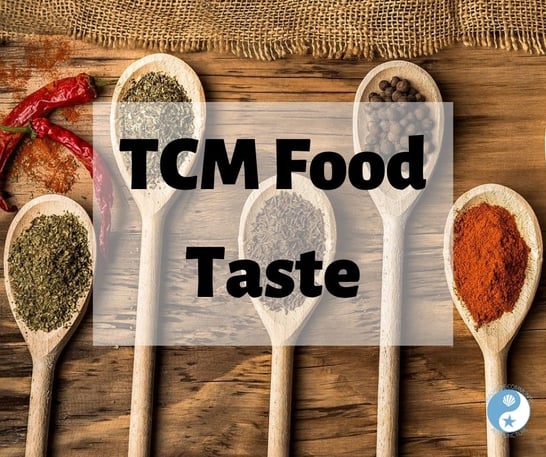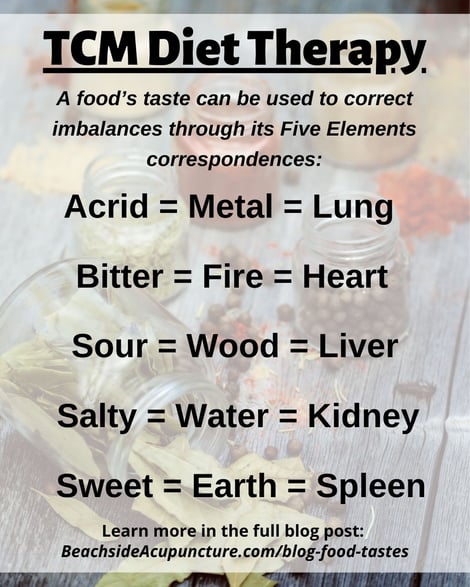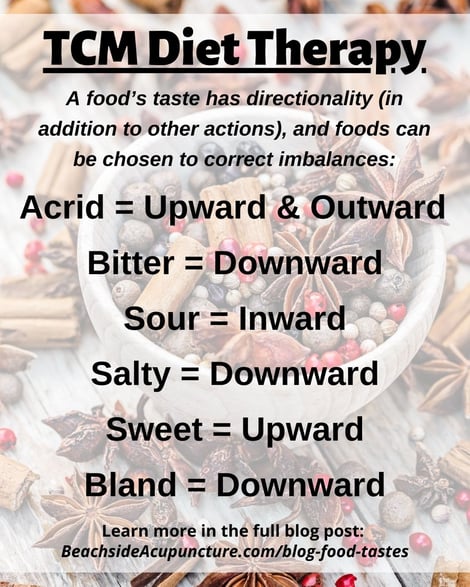
This post contains affiliate links, meaning Beachside Community Acupuncture PLLC may receive a small commission for purchases made through certain links at no additional cost to you. (In other words, you support us in a small way when you buy the products that we highly recommend and would use ourselves!) Click here to view our full disclosure policy.
Traditional Chinese Medicine (TCM) has a very different way of looking at diet, viewing food and beverages in the same light as herbal medicine. Consumables can be classified in terms of their inherent temperature and their inherent taste:
- Acrid (or pungent) tends to have a strong flavor, such as garlic and cinnamon, and is often associated with spices.
- Bitter is often greens, such as endive and radicchio, but bitter melon is another great example.
- Sour can be obvious - like vinegar and citrus - but other foods like olives and mangoes also have a sour component.
- Salty includes those that actually taste salty - e.g. seaweed - but encompasses fish and other foods too.
- Sweet is more than just sweeteners and fruit; meats, vegetables, etc. can be in this category.
- Bland is very mild or almost tasteless; think cucumber and Job's tears.
Many times a food item is a combination of two or more of the tastes, and the taste sensed by the tongue doesn't necessarily coincide with the TCM taste classification. The end of this post will cover how to research foods to learn their intrinsic energetics, but first it's important to understand the various ways taste affects the body.
Food Taste According to the Five Elements
Out of the six tastes in TCM diet therapy, five of them correspond to the Five Elements:
- Acrid = Metal
- Bitter = Fire
- Sour = Wood
- Salty = Water
- Sweet = Earth
The Five Elements have a vast array of correlations in nature and in health, but arguably the most important one in diet therapy is the relationship with the organs, especially the five main Yin organs:
- Acrid = Lung
- Bitter = Heart
- Sour = Liver
- Salty = Kidney
- Sweet = Spleen
Eating too much of a particular taste can lead to a disharmony in an organ system...and if there's already a disharmony in an organ system - because of an emotional influence, for example - mindfully adding more of its taste can be beneficial.

Food Taste Actions
In addition to the Five Element correspondences, each taste has its own independent effect on the body. While it's never a good idea to completely ignore one aspect of wellness to focus on another, tastes can be chosen to correct conditions based on action with less regard to the organ system involved.
Acrid
Acrid moves Qi and expels exterior pathogens. Its directions are up and out, and consuming too much of it can be drying.
- Pain can be diagnosed as a Qi stagnation and/or Blood stasis, so it makes sense that acrid spices like turmeric help inflammation.
- Internally, a hallmark sign of Liver Qi Stagnation is the inability to manage stress or even increased irritability, and some acrid herbs like Peppermint correct this imbalance.
- Common colds are the invasion of pathogens from the exterior, and acrid can push them out and/or induce sweating to clear them.
Bitter
Bitter clears Heat, dries Dampness, and drains downward. Too much bitter can lead to Cold and Dryness, but most Americans consume very few bitter foods.
- Heat conditions include red skin rashes, fever, night sweats, hot joints, and even general inflammation; most people would benefit from eating bitter greens!
- Coughing, vomiting, or any other condition of something going up that shouldn't be would logically be corrected by bitter's downward action, as would constipation.
- Dampness is the "sneakiest" pathogen but is obvious in discharge and phlegm. If phlegm is yellow or green in color (indicating Heat), bitter works on two levels.
Sour
Sour - and its close relative, astringent - corrects abnormal leakage and draws inward. It would be contraindicated in any circumstance that requires movement outward (e.g. common cold or constipation).
- Abnormal leakage can mean discharge, excessive sweating, excessive bleeding, etc.
- Sour can also help regulate diarrhea.
Salty
Salty softens hardness, resolves masses, and drains downward. Western medicine often advises against salt because a diet composed of processed foods will already be high in sodium, but real salt and salty foods have plenty of health benefits.
- Masses are cysts, fibromas, lumps, etc.
- Salty is especially good for constipation in which stool is compacted.
Sweet
Sweet moistens, aids digestion, tonifies, and harmonizes. All of these sound amazing, right? In moderation they are, but too much sweet - a common issue - can be cloying and stall digestion because of its upward directionality.
- Cramping or spasms can be relieved with sweet.
- Most know from experience that a small amount of sweet, like an after-dinner mint candy, can settle digestion and increase energy.
Bland
Bland promotes urination and drains downward, acting as a diuretic. This downward directionality is much gentler than that of salty and bitter, and bland tends to be very mild as a whole.
- Edema and swelling both benefit from bland foods.
- Chronic urinary issues are an indication for bland, and while bland may be helpful in acute urinary conditions, it should usually be combined with other tastes for a stronger effect. For example, the burning sensation associated with a urinary tract infection (UTI) calls for bitter.

Balanced Diet
A well-rounded diet contains a balance of every taste, but if a health concern is present, the corrective taste can be favored until symptoms resolve. Taste doesn't always correspond to flavor, though, so true diet therapy may require a bit more research.
Running an online search for something along the lines of "[food] taste in TCM" can bring up helpful information, but check a few sites to make sure their information lines up. We also recommend these books for their more detailed explanations and their recipes:
This post was originally published in February of 2019 and was updated in August of 2025.

Kathleen Ketola is a Licensed Acupuncturist and the owner of Beachside Community Acupuncture. She loves providing affordable acupuncture to the residents of McKinney, Texas, and surrounding cities like Prosper, Frisco, and Melissa, but she also enjoys educating the general public on how acupuncture and Traditional Chinese Medicine (TCM) can treat everything from pain to infertility to stress and beyond. Book online or contact her at (214) 417-2260 if you'd like to schedule an appointment.










Write a comment